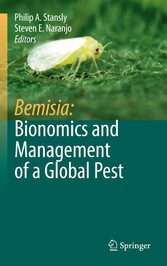Suchen und Finden

Bemisia: Bionomics and Management of a Global Pest
Bemisia tabaci (Gennedius) has distinguished itself from the more than 1,000 whitefly species in the world by its adaptability, persistence and potential to damage a wide range of agricultural and horticultural crops in all six of the world's inhabited continents. B. tabaci inflicts plant damage through direct feeding, inducement of plant disorders, vectoring of plant viruses and excretion of honeydew. This book collates multiple aspects of the pest ranging from basic to applied science and molecular to landscape levels of investigation. Experts in multiple disciplines provide broad, but detailed summaries and discussion of taxonomy, genetics, anatomy, morphology, physiology, behavior, ecology, symbiotic relationships, virus vector associations and various tactics for integrated management of this pest insect. The book is focused primarily on progress during the last 10-15 years and is directed at workers in the field as well as the informed professional who may not necessarily specialize in whitefly research. The book is unique in providing broad coverage in relatively few chapters by recognized experts that highlight the state-of-the-art in our understanding of this fascinating but troublesome cosmopolitan pest.
Phil Stansly
Dr. Stansly had his first experience in entomology establishing ladybeetles for biological control of scale insects in date groves of Northern Niger, (1973-1976). He then received his master's degree in zoology from the University of Oklahoma (1978), using the ladybeetle work as a thesis. He earned a Ph.D. in Entomology from Texas A&M (1984) studying the ecology of the boll weevil Anthonomus grandis on native host plants in Tabasco, Mexico. As a post-doctoral associate for the State University of New York at Stony Brook (1985-1986), he studied the ecology of mound-building, nasute termites in the llanos of Venezuela. In 1986, Dr. Stansly joined the University of Florida faculty as head of a project to implement IPM with row-crop farmers of Coastal Ecuador, financed by USAID (1986-1989). He came to the University of Florida Research and Education center in Immokalee in 1989, where his research and extension activities focused on management of Bemisia tabaci and associated viruses in vegetables, as well as on biological control and integrated pest management in citrus, vegetables and sugarcane. He is author or co-author of 400 professional and trade journal articles, book chapters and extension articles, of which 134 relate specifically to Bemisia.
Steven Naranjo
Dr. Naranjo holds a Ph.D. (1987) in Entomology from Cornell University, a M.S. (1983) in Entomology from the University of Florida, and a B.S. (1978) in Zoology from Colorado State University. Dr. Naranjo joined the USDA, Agricultural Research Service in 1988 and currently serves as Research Leader for the Pest Management and Biocontrol Research Unit at the Arid-Land Agricultural Research Center in Maricopa, Arizona. He is internationally recognized for his research in insect sampling and decision aids, integrated pest management, conservation biological control, insect predator ecology, and assessment of nontarget impacts of transgenic crops. Dr. Naranjo was a key architect in the development and implementation of a highly successful IPM program for sweetpotato whitefly in Arizona cotton that has been widely adopted in other parts of the world. He has authored over 170 peer-reviewed papers, book chapters and technical articles, served as Co-Editor-in-Chief of the international journal Crop Protection from 1995-2006, and is currently Subject Editor for Environmental Entomology, overseeing the journal section 'Transgenic Plants and Insects'. Dr. Naranjo holds an adjunct appointment in the Department of Entomology at the University of Arizona.
Alle Preise verstehen sich inklusive der gesetzlichen MwSt.






